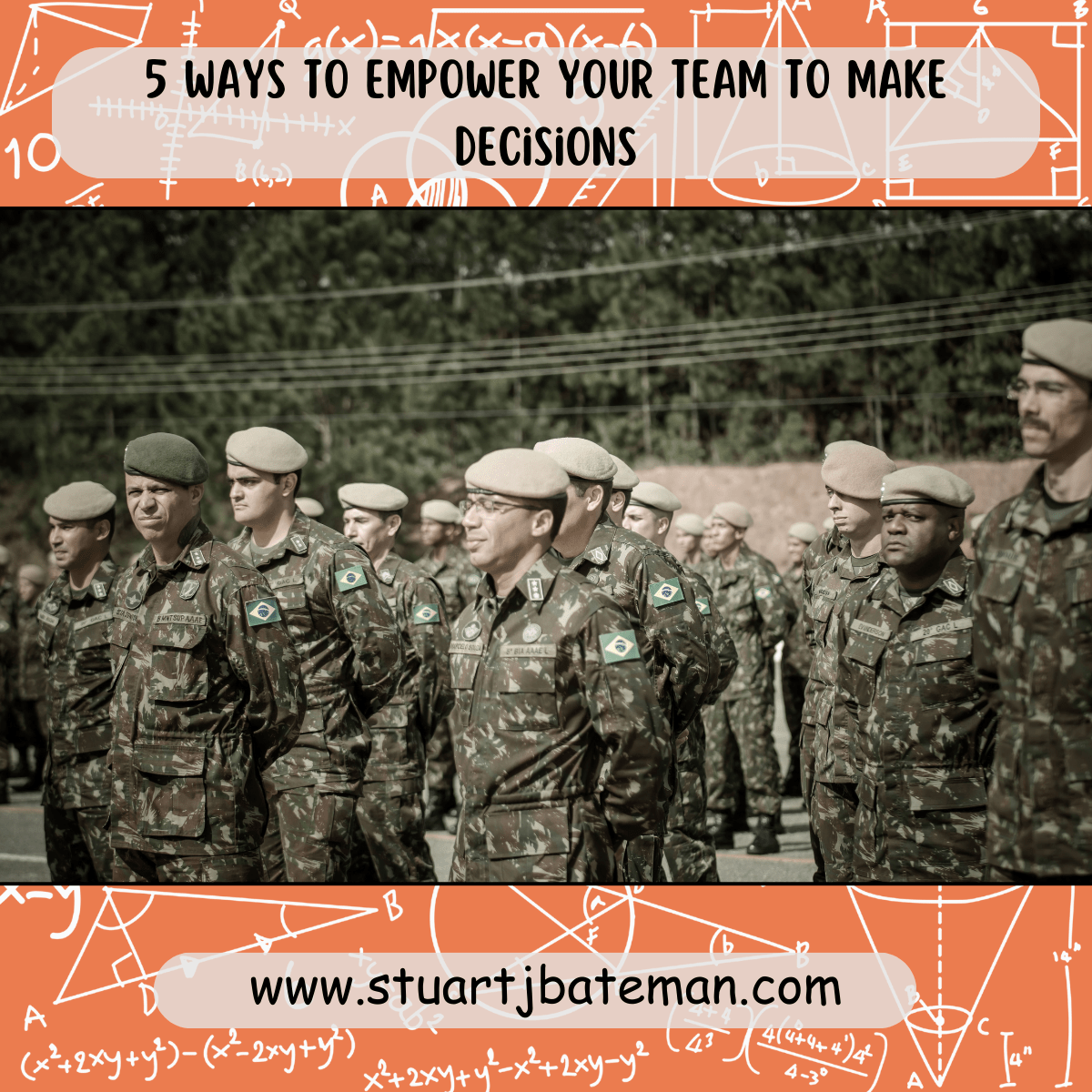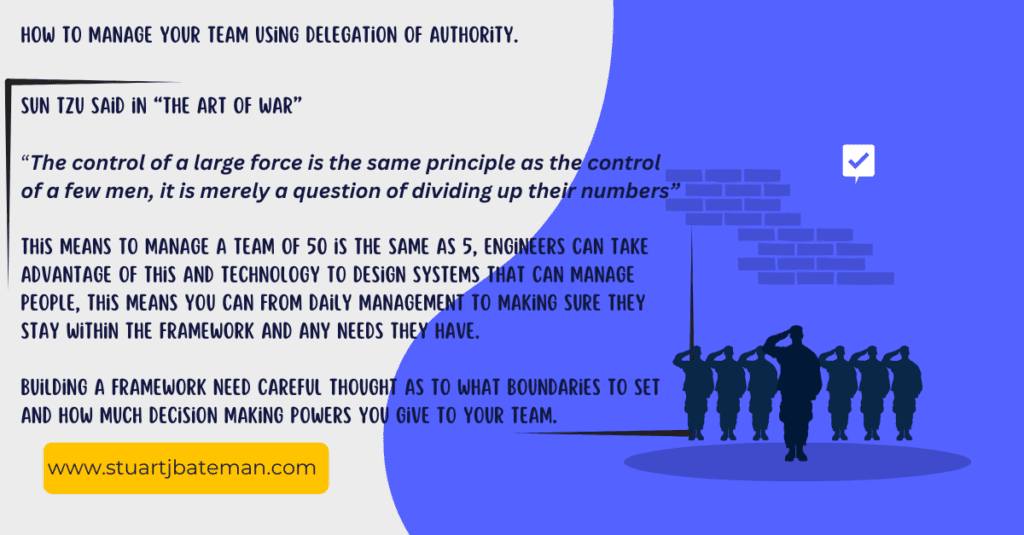Strategic Delegation: Applying Military Wisdom to Efficiently Manage Teams
It is your job to train those around you to be effective and efficient.- 4 hour work week

Building a system.
In military strategy, there’s a prevailing notion that overseeing a vast force from a single command point is an impractical endeavour. The solution, often employed in practice, involves decentralization — the strategic delegation of powers to smaller units. This approach empowers these units to make informed decisions based on predefined instructions, particularly in response to specific scenarios or unexpected events.
My Experience.
While my professional domain may not be a military unit, I’ve successfully applied this principle to remotely manage a department, all while maintaining focus on my own responsibilities. The first crucial step involved formulating a set of rules tailored to the intricacies of the department. This necessitated an intimate understanding of the team’s day-to-day operations, the nature of incoming work, the individuals involved, and the types of tasks at hand. Documenting these insights allowed me to construct a comprehensive priority list.
The priority list became the linchpin of our operational strategy. Each incoming task was assessed against this list, determining whether an operator should divert from their current task to address the new assignment or if it should be queued alongside others for subsequent attention. Initially conveyed verbally, this process required my occasional presence or intervention to prevent deviations from the established order, prompting ongoing refinements to the rules.

Once satisfied with the efficacy of these rules, the next phase involved automating the workflow. A VBA spreadsheet was meticulously designed to manage tasks and prioritize them based on responses to a set of predefined questions posed to those requesting the work. This shifted the decision-making process away from the team, allowing them to adhere to the established list. However, the evolving nature of our operations highlighted the need for additional rules, especially for critical or crisis situations, which were explicitly delegated to the team.
This system has been operational for five years, effectively steering the team with minimal direct involvement from me, unless updates to the spreadsheet or insights from our weekly meetings are necessary. This experience underscores the strategic mindset of crafting systems to manage complex scenarios with limited resources, ultimately enhancing productivity through intelligent design.
5 Key takeaways to implementing strategic delegation
- Deep Understanding Before Delegation:
- Tip: Ensure a thorough comprehension of your team’s day-to-day operations, individual dynamics, and task intricacies before formulating delegation strategies.
- Why: This foundational understanding allows you to create rules and systems tailored to the specific needs of your department, fostering effective delegation.

- Document and Prioritize:
- Tip: Document insights gained and construct a comprehensive priority list as the linchpin of your operational strategy.
- Why: Having a well-documented priority list provides a structured framework for assessing and addressing incoming tasks, aiding in informed decision-making.

- Continuous Refinement and Adaptation:
- Tip: Regularly revisit and refine your delegation rules and processes based on operational insights and evolving scenarios.
- Why: Ongoing refinement ensures that your strategies remain effective and adaptable to changing circumstances, preventing deviations from established orders.

- Automation for Efficiency:
- Tip: Once satisfied with manual processes, consider automation to streamline workflows and reduce direct team involvement in decision-making.
- Why: Automation enhances efficiency by shifting routine decision-making to systems, freeing up time for strategic interventions and minimizing operational bottlenecks.

- Strategic Delegation in Crisis Situations:
- Tip: Explicitly delegate rules for critical or crisis situations to your team, ensuring they can effectively handle unexpected events.
- Why: Clearly defined crisis management rules empower your team to make informed decisions during high-pressure situations, maintaining operational resilience.
Conclusion and thoughts on strategic delegation.
In management, the principle of strategic delegation proves to be a beacon of strategic wisdom. Drawing inspiration from military strategy, the journey from a hands-on approach to a well-defined, automated system has demonstrated the efficacy of intelligent design in steering a team. The five-year operational success stands as a testament to the power of deep understanding, meticulous documentation, continuous refinement, strategic automation, and explicit strategic delegation in fostering productivity.
As we navigate the complexities of leadership, it becomes evident that crafting systems tailored to the unique needs of a department not only empowers teams but also liberates leaders to focus on strategic interventions. This experience underscores the timeless truth that effective delegation is an art that combines insight, adaptability, and a commitment to optimizing operational workflows.
To quote Atomic habits:
You don’t rise to the level of your goals, you fall to the level of your systems.
Embark on your journey of strategic delegation. Assess your team’s dynamics, document insights, and construct a priority framework. Embrace continuous refinement and, when ready, explore automation to elevate efficiency. Explicitly delegate crisis management rules to empower your team in unforeseen circumstances. Share your experiences, challenges, and successes in the comments below. Let’s build a community of leaders dedicated to enhancing productivity through intelligent design. Together, we can shape the future of effective management.



What are your thoughts? Have I covered everything or is there more you know and would like to share?
I’m always learning and improving this site and my blogs, so please feel free to get in touch with me via LinkedIn or this site to discuss any topics I have covered.
If you’re having trouble finding ways to progress check out these sites filled with free learning tools:


Discover more from The Chartered Engineer
Subscribe to get the latest posts sent to your email.